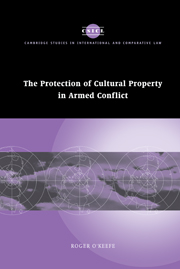Book contents
- Frontmatter
- Contents
- Acknowledgements
- Table of cases
- Table of treaties and other international instruments
- List of abbreviations
- Prologue
- 1 From the high Renaissance to the Hague Rules
- 2 1914 to 1954
- 3 The 1954 Hague Convention and First Hague Protocol
- 4 The 1977 Additional Protocols
- 5 The 1999 Second Hague Protocol
- 6 Other relevant bodies of law
- Epilogue
- Bibliography
- Index
- CAMBRIDGE STUDIES IN INTERNATIONAL AND COMPARATIVE LAW
2 - 1914 to 1954
Published online by Cambridge University Press: 28 July 2009
- Frontmatter
- Contents
- Acknowledgements
- Table of cases
- Table of treaties and other international instruments
- List of abbreviations
- Prologue
- 1 From the high Renaissance to the Hague Rules
- 2 1914 to 1954
- 3 The 1954 Hague Convention and First Hague Protocol
- 4 The 1977 Additional Protocols
- 5 The 1999 Second Hague Protocol
- 6 Other relevant bodies of law
- Epilogue
- Bibliography
- Index
- CAMBRIDGE STUDIES IN INTERNATIONAL AND COMPARATIVE LAW
Summary
The period 1914 to 1954, spanning the two most murderous and destructive conflicts in history, witnessed an upheaval in the laws of war relating to the protection of civilians and civilian property in bombardment. The advent of aerial bombing and the realisation of the logic of total war led to the eclipse in the First World War of the relevant Hague Rules, with baleful incidental consequences for cultural property. In their place emerged the outlines in the interwar years of a new law of aerial bombardment. But these rudiments were insufficient during the Second World War to prevent the devastation from the air of the civilian populations and cities – and, with them, the material cultural heritage – of Germany and Japan. When it came to the destruction of cultural property by other means, however, and to its plunder, the rules codified in the Hague provisions, although flouted by Germany on an almost unimaginable scale in the Second World War, survived and were lent criminal sanction at Nuremberg.
The close of the First World War and the interwar period also saw early moves towards a specialised legal regime for the protection of cultural property in time of war, a regime which, while not formally in place in the Second World War, informed many of the measures adopted by the belligerents with a view to safeguarding monuments and other cultural treasures.
- Type
- Chapter
- Information
- The Protection of Cultural Property in Armed Conflict , pp. 35 - 91Publisher: Cambridge University PressPrint publication year: 2006



